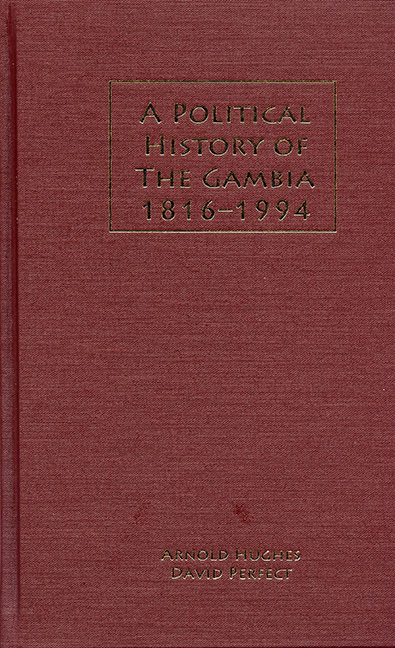Book contents
- Frontmatter
- Dedication
- Map
- Contents
- List of Tables
- List of Interviewees
- Acknowledgments
- Abbreviations
- Introduction
- 1 Social and Economic Setting
- 2 Constitutional Change in The Gambia, 1816–1994
- 3 Merchants and Recaptives: The Origins of Modern Politics, 1816–86
- 4 Patrician Politics in the Era of the Forsters, 1886–1941
- 5 The Establishment of Party Politics, 1941–59
- 6 The “Green Uprising”: The Emergence of the People's Progressive Party, 1959–65
- 7 Electoral Politics, 1965–81
- 8 Radical and Insurrectionary Political Challenges, 1965–81
- 9 Electoral Politics, 1981–94
- 10 The Gambia's External Relations, 1965–94
- 11 The 1994 Coup and the Jawara Legacy
- Appendix A Major Constitutional Changes, 1816–1994
- Appendix B Legislative Council Election Results, 1947–54
- Appendix C General Election and By-Election Results, 1960–93
- Appendix D Presidential Election Results, 1982–92
- Appendix E Republic Referendum Results, 1970
- Appendix F Primary Sources
- Appendix G Newspapers and Magazines Consulted
- Notes
- Bibliography
- Index
- Rochester Studies in African History and the Diasora
7 - Electoral Politics, 1965–81
Published online by Cambridge University Press: 13 April 2017
- Frontmatter
- Dedication
- Map
- Contents
- List of Tables
- List of Interviewees
- Acknowledgments
- Abbreviations
- Introduction
- 1 Social and Economic Setting
- 2 Constitutional Change in The Gambia, 1816–1994
- 3 Merchants and Recaptives: The Origins of Modern Politics, 1816–86
- 4 Patrician Politics in the Era of the Forsters, 1886–1941
- 5 The Establishment of Party Politics, 1941–59
- 6 The “Green Uprising”: The Emergence of the People's Progressive Party, 1959–65
- 7 Electoral Politics, 1965–81
- 8 Radical and Insurrectionary Political Challenges, 1965–81
- 9 Electoral Politics, 1981–94
- 10 The Gambia's External Relations, 1965–94
- 11 The 1994 Coup and the Jawara Legacy
- Appendix A Major Constitutional Changes, 1816–1994
- Appendix B Legislative Council Election Results, 1947–54
- Appendix C General Election and By-Election Results, 1960–93
- Appendix D Presidential Election Results, 1982–92
- Appendix E Republic Referendum Results, 1970
- Appendix F Primary Sources
- Appendix G Newspapers and Magazines Consulted
- Notes
- Bibliography
- Index
- Rochester Studies in African History and the Diasora
Summary
The first year or so of independence appeared to confirm the viability of the two-party political system in The Gambia: an early prospect of a one-party state through a coalition of the two major parties foundered; an attempt by the People's Progressive Party (PPP) to introduce a republican constitution by means of a national referendum in November 1965 was narrowly defeated; and even though the PPP easily defeated the United Party (UP) in the parliamentary election of Spring 1966, the latter won sufficient seats and achieved a large enough share of the vote to provide a credible opposition. However, over the next few years, the PPP steadily eroded UP support in Parliament and the country at large, culminating in its near annihilation in the general election of 1972. At the same time, the PPP overcame splits within its own ranks in 1968–70, which resulted in the formation of the People's Progressive Alliance (PPA) and succeeded a second time round, in April 1970, in winning a republic referendum, transforming Dawda Jawara from the prime minister to an executive president of the new republic.
The ruling party, as far as the established opposition was concerned, seemed invincible and any threat to its position now depended on further internal fragmentation. Such a prospect reemerged twice in the 1970s, first with the Independents in 1972 and then with the National Convention Party (NCP) in 1975; but these threats were also successfully countered.
This chapter examines the course of Gambian politics in the first fifteen years of independence and offers explanations for the transformation from a working two-party system to de facto single-party government. It also places Gambian post-independence politics within a broader context, by examining some of the similarities and differences between its experience and those of other African countries.
1965 Republic Referendum
Two months after independence, in April 1965, Jawara informed the governor general, Sir John Paul, that he was contemplating replacing the monarchy with a republic on the first anniversary of independence in February 1966. The decision was formally approved by the cabinet in mid-May and made public soon afterward; in a speech to the House of Representatives on June 1, Jawara outlined the reasons for the proposed constitutional change.
- Type
- Chapter
- Information
- A Political History of the Gambia, 1816–1994 , pp. 160 - 197Publisher: Boydell & BrewerPrint publication year: 2006

